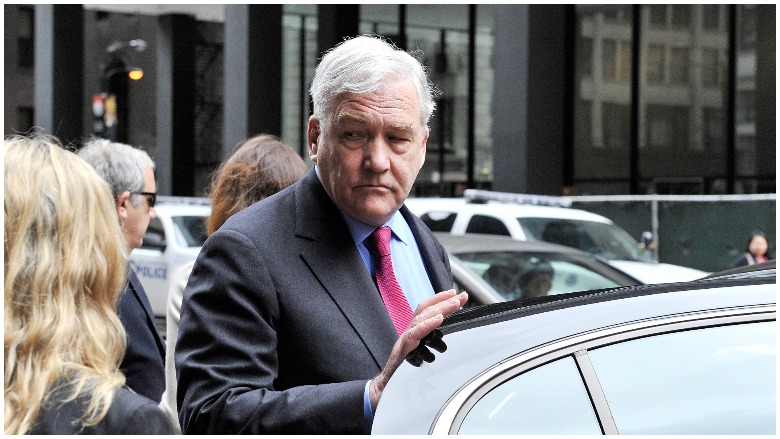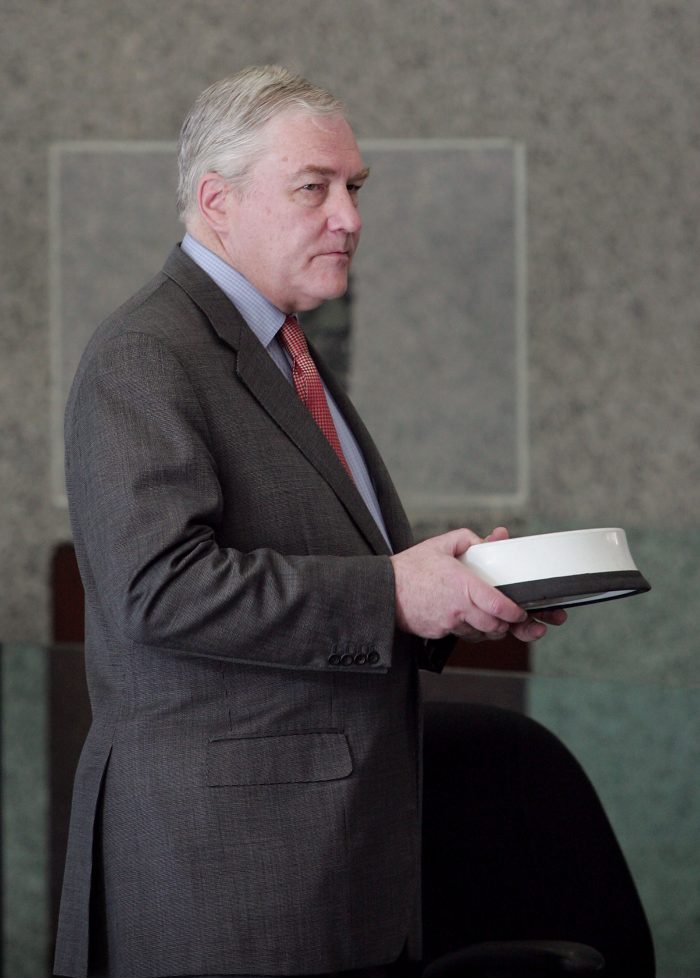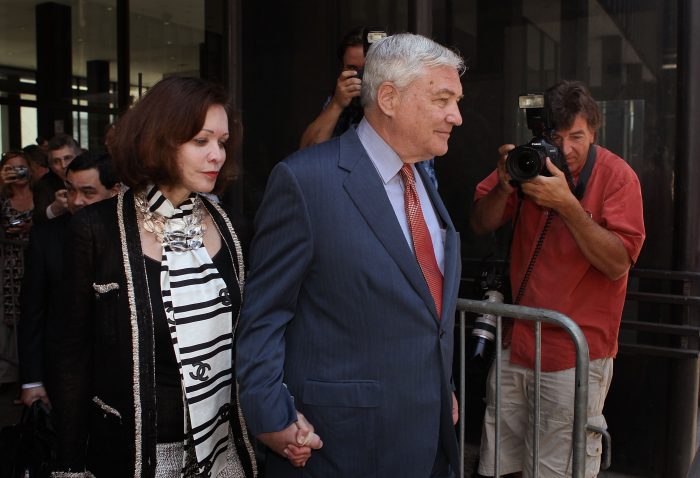
Conrad Black, a former newspaper publisher who spent more than three years in prison after being convicted of stealing tens of millions of dollars from his company, and who wrote a book in 2018 praising Donald Trump’s presidency, has been officially pardoned by President Trump.
The White House made the announcement on May 15, 2019. In the news release, Press Secretary Sarah Sanders wrote that the Supreme Court had previously “overturned almost all charges in his case.” In 2010, the 7th U.S. Circuit Court of Appeals in Chicago vacated two of the fraud convictions but reaffirmed the convictions on one count of fraud and one count of obstruction of justice, as explained by the Chicago Tribune.
Black, 74, expressed his surprise upon learning of the clemency declaration. He wrote on Twitter that when he was told he had a phone call from the White House, he thought his friends were playing a prank on him.
Black, who is a native of Canada, is a longtime associate and ally of Donald Trump. He referred to Trump as an “old friend” in a 2015 article praising his candidacy.
Here’s what you need to know.
1. Conrad Black Was Found Guilty By a Chicago Jury in 2007 After Being Accused of Embezzling $60 Million From His Own Company, Hollinger International
Conrad Black previously served as the chief executive of Hollinger International, which has since been renamed the Sun-Times Media Group. The company owned multiple newspapers around the world, including the Chicago Sun-Times and the Daily Telegraph in London.
Black and the president of the company, F. David Radler, were both removed from their positions in late 2003. According to a 2007 New York Times article, Black at the time stated that he thought his company was being stolen from him by “corporate governance ‘terrorists.'”
Black and Radler were both accused in 2005 of taking tens of millions of dollars that prosecutors argued belonged to Hollinger International. The amount was initially $80 million but lowered to $60 million before the trial began. Radler agreed to plead guilty to a single count of fraud and testified against Black.
The New York Times reported in 2007 that Donald Trump was originally on the list to testify on Black’s behalf. But the defense team ultimately decided not to call him as a witness.
The jury ultimately found Black guilty of three counts of mail fraud and one count of obstruction of justice. The latter charge came from allegations that Black had removed boxes of documents from his office in Toronto ahead of the trial. Black wrote in an editorial following his pardon that the boxes had contained material that had already been handed over to the Securities and Exchange Commission; he stated that he had permission from the acting president of the company.
Following the 2007 conviction, Black was sentenced to more than six years in prison but released after two years of detention. After two of the mail fraud charges were vacated and the other two charges upheld, a federal judge resentenced him to 3.5 years in prison. Black was released in 2012 after serving about a year and returned to Canada.
2. Conrad Black Described Donald Trump as ‘The Good Guy’ During the Primary Election & Wrote a Book Praising His Presidency in 2018
Conrad Black is a self-proclaimed “old friend” of President Trump. In December 2015, Black wrote an editorial for the National Review listing why he believed Donald Trump would make a great president. He described Trump as “the good guy” and listed Trump’s positions on issues including gun control, immigration and defense spending. He praised Trump as someone who, as a billionaire, did not have to seek financial “life support from controversial individual sources, or from a vast and aggressive fundraising organization, or from a coalition of sleazy and opinionated philistines in the entertainment industry.”
In the last paragraph, Black brings up President Nixon and Watergate. The Russia investigation and the probes into President Trump’s background have been compared to Watergate. Black slammed the media for its coverage of Trump. “Donald Trump — who, I should disclose, is an old friend, a fine and generous and loyal man, and a delightful companion — is striking very close to the heart of the American problem: the corrupt, dysfunctional political system and the dishonest media. My view, as persevering readers know, is that it all started to go horribly wrong with Watergate, when one of the most successful administrations in the country’s history was torn apart for no remotely adequate reason and the mendacious assassins in the liberal media have been awarding themselves prizes and commendations for 40 years since.”
Trump expressed gratitude when the article was published. He wrote on Twitter, “.@ConradMBlack, what an honor to read your piece. As one of the truly great intellects & my friend, I won’t forget!”
Black then wrote a book called “Donald J. Trump: A President Like No Other” in 2018. At the beginning of the book, Black praises Trump for the ability to set the narrative. “Trump is untroubled by what he calls his ‘truthful hyperbole’ and ‘alternate facts’ that are ‘essentially true.’ Trump rarely tells outright lies such as the media endlessly impute to him, and a political leader who fudges facts is hardly unprecedented. For Trump, establishing the facts of a matter is as much a competition as anything else.”
The White House did not mention Black’s article or the book when announcing the pardon. Black claimed that during his phone call with the president, Trump said he was issuing the pardon because he believed Black had been innocent. “‘We’ve known each other a long time,’ the president told me, ‘but that wasn’t any part of the reason. Nor has any of the supportive things you’ve said and written about me.'”
3. Conrad Black Had a Lengthy Career as a Newspaper Publisher & Has Written Books on Franklin Roosevelt & Richard Nixon

GettyFormer Hollinger International CEO Conrad Black arrives at court June 18, 2007 in Chicago, Illinois.
Conrad Black began buying newspapers while he was still a college student. According to his Linkedin profile, Black bought the Eastern Township Advertiser, a Quebec newspaper, in 1966. Along with his friend David Radler, they formed Sterling Newspapers Limited in 1971. The company expanded by buying multiple local newspapers across Canada.
Black went on to become the chairman of Hollinger International and continued to acquire publications. The company launched the Toronto-based newspaper the National Post in 1998. Other newspapers part of the media empire included the Chicago Sun-Times, the Jerusalem Post and the Daily Telegraph in London. Hollinger reportedly began selling some of its local newspapers during the 1990s to relieve itself of debt. During the fraud trial in 2007, prosecutors accused Black of taking illegal payments from the companies that were purchasing the newspapers as part of non-compete agreements.
In addition to his media career, Black has also written multiple books, including two on former U.S. presidents. He published “Franklin Delano Roosevelt: Champion of Freedom” in 2003 and “Richard M. Nixon: A Life in Full” in 2007.
4. Black Was Born in Canada, Was Expelled From Three Schools & Became a British Lord in 2001
Conrad Black was born and raised in Montreal, Canada and has one older brother. Black attended Upper Canada College in Toronto, a private prep school that educates boys from kindergarten through high school. He was expelled during high school for selling exams to other students, according to the Guardian. Black was expelled from a second high school, the Trinity College School, for “insubordinate behaviour,” according to the Star.
Black shared on his Linkedin page that he “quit but graduated independently” from his third high school, Thornton Hall in Toronto. He earned a bachelor’s degree in history from Carleton University in Ottawa in 1965. Black also shared on Linkedin that he attended Osgoode Hall Law School at York University, but was expelled from there as well. He says he has a master’s degree from McGill University.
In 2001, Black made the decision to renounce his Canadian citizenship in order to accept a position in the British House of Lords. He became Lord Black of Crossharbour, a position he appears to still hold.
5. Conrad Black Has Been Married Twice & Has Three Children

GettyConrad Black and his wife Barbara Amiel leave the Dirksen Federal Building following a hearing detailing the terms of his bail July 23, 2010 in Chicago, Illinois.
Conrad Black married his first wife, Joanna Hishon, in 1978. According to the Peerage, an index of members of the British House of Lord, her full name was Shirley Gail Walters Hishon. They had two sons and a daughter together and divorced in 1992.
That same year, Black married his second wife, Barbara Amiel. She was born in Britain and worked as a journalist. The Steeple Times described Amiel as being famous for “extravagance that knows no bounds.” Amiel stuck by her husband’s side during his trial and was photographed outside of the courthouse with him.
READ NEXT: Woman Charged With Murder After Pushing Elderly Man Off Bus